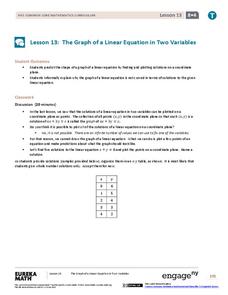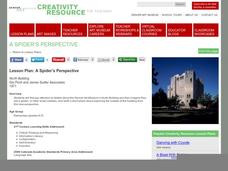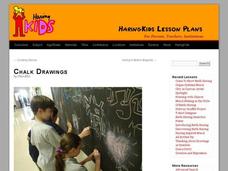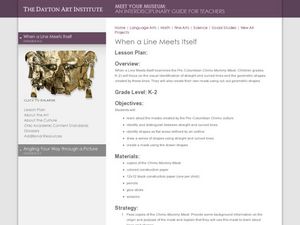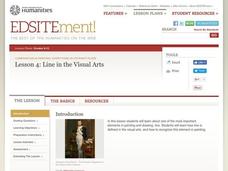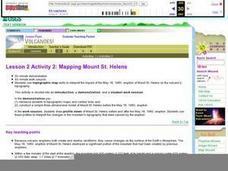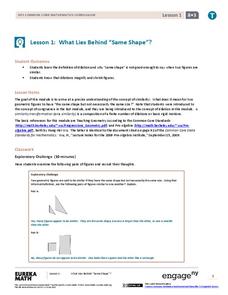EngageNY
Using Linear Models in a Data Context
Practice using linear models to answer a question of interest. The 12th installment of a 16-part module combines many of the skills from previous lessons. It has scholars draw scatter plots and trend lines, develop linear models, and...
EngageNY
Distance on the Coordinate Plane
Scholars learn how to find the distance of vertical and horizontal line segments on the coordinate plane in the 19th installment of a 21-part module. The use of absolute value comes in handy.
Curated OER
Place Value and Rounding
Use rounding mountains and number lines to learn how to round numbers and learn place value. Learners will use a worksheet to help them round numbers. They will play a game called "Place Value Match-up" to help with skill practice. All...
Curated OER
Relief Drawing
High schoolers choose an interesting view for an art relief project. They outline their composition, and shade their relief using charcoal pencil. The results are fabulous! One nice thing about this art project is that the materials...
EngageNY
The Graph of a Linear Equation in Two Variables
Add more points on the graph ... and it still remains a line! The 13th installment in a series of 33 leads the class to the understanding that the graph of linear equation is a line. Pupils find several solutions to a two-variable linear...
Curated OER
Changing Planet: Sea Levels Rising
Begin by showing a six-minute video, Changing Planet: Rising Sea Level as an anticipatory set. Pupils draw a topographic map of a potato continent. Finally, they will visit NOAA's sea levels online map and NASA's carbon dioxide...
Curated OER
Lesson: A Spider's Perspective
A fun way to grow a class of creative thinkers, is to add creative projects to your weekly line up. Kids pretend they are small insects or spiders crawling up the side of a huge building. They use vivid imagery, rich detail, and their...
Curated OER
Chalk Drawings
Students create their own chalk drawings on a chalk board inspired by the work of Keith Haring. In this chalk drawings lesson plan, students draw symbols and lines in different colors.
Curated OER
Patterns, Patterns, Patterns
Create geometric art in your classroom. Learners use a ruler to mark lines on their paper, they then trace a lid to create a series of circles. They color in each circle using two tones or colors to create an interesting visual...
Curated OER
Seeing is Believing .... Or Is It?
Pupils look critically at digital photographs, line drawings, and cartoon images in order to comprehend the differences between exact and exaggerated representation. They create their own drawings and cartoons based on their observations...
Curated OER
Animal Morphs
Students explore animal drawing. In this cross curriculum drawing, photography, and animals lesson, students combine computer drawing and freehand drawing to create an animal and its environment using a photograph of their...
Curated OER
When A Line Meets Itself
Students investigate the linear characteristics of cultural art. In this art analysis instructional activity, students discover the Pre-Columbian Chimu culture and the many masks they created. Students identify the different...
Curated OER
Drawing - Swan Lesson and the Blue Heron Lesson
Students draw a swan and heron from step-by-step instructions. They discuss characteristics of the swan and its environment. Students study and write a paragraph, story, or report illustrating their picture.
Dick Blick Art Materials
“Decalcomania” Glue Paint Symmetry Prints
Who knew you could paint with glue? After first adding liquid water color paints to bottles of white Elmer's glue and applying them to paper, young scholars of all ages are then challenged to use their imagination and...
Read Works
A Busy Bird
Kindergartners read a short passage and answer questions based on what they read. The question set involves circling pictures, writing words, and drawing pictures.
Curated OER
Follow the Leader: Line in the Visual Arts
Students identify line in the composition of a number of art works. They explain how the artist's compositional choices guide the viewer's eye to important components of the image. Students identify sight lines in several paintings and...
Dick Blick Art Materials
Ball Point Engravings
Turn simple pencil sketches into colorful engravings. After first creating hand-drawn pictures, young artists then trace over them will ball point pens, etching the images into cold press illustration boards, before rubbing...
Curated OER
Musical Moods
To celebrate diversity and the purpose of Harmony Day, the class examines culturally diverse music and expression through line drawing. They discuss that all cultures produce music and that music can convey mood just like art can. As the...
Knoxville Art Museum
Lee Walton: Codes in Drawings
Familiar with the systems-based sports drawing of experimental artist Lee Walton? If so, this drawing exercise if for you. Young artists observe an activity over time, develop a coded language for the activity, and then draw a...
EngageNY
Angle Sum of a Triangle
Prove the Angle Sum Theorem of a triangle using parallel line and transversal angle relationships. Pupils create a triangle from parallel lines and transversals. They find angle measures to show that the angles of a triangle must total...
EngageNY
Definition of Rotation and Basic Properties
Examine the process of rotating images to visualize effects of changes to them. The fifth lesson of 18 prompts pupils to rotate different images to various degrees of rotation. It pays special attention to rotations in multiples of 90...
Curated OER
Lesson 2 Activity 2: Mapping Mount St. Helens
Students use topographic map skills to interpret impact of the May 18, 1980 eruption of Mount St. Helens on the volcano's topography, and draw profile views of Mount St. Helens before and after the May 18, 1980, eruption.
EngageNY
More Division Stories
Don't part with a resource on partitive division. Continuing along the lines of the previous lesson, pupils create stories for division problems, this time for partitive division problems. Trying out different situations and units allows...
EngageNY
What Lies Behind “Same Shape”?
Develop a more precise definition of similar. The lesson begins with an informal definition of similar figures and develops the need to be more precise. The class learns about dilations and uses that knowledge to arrive at a...




